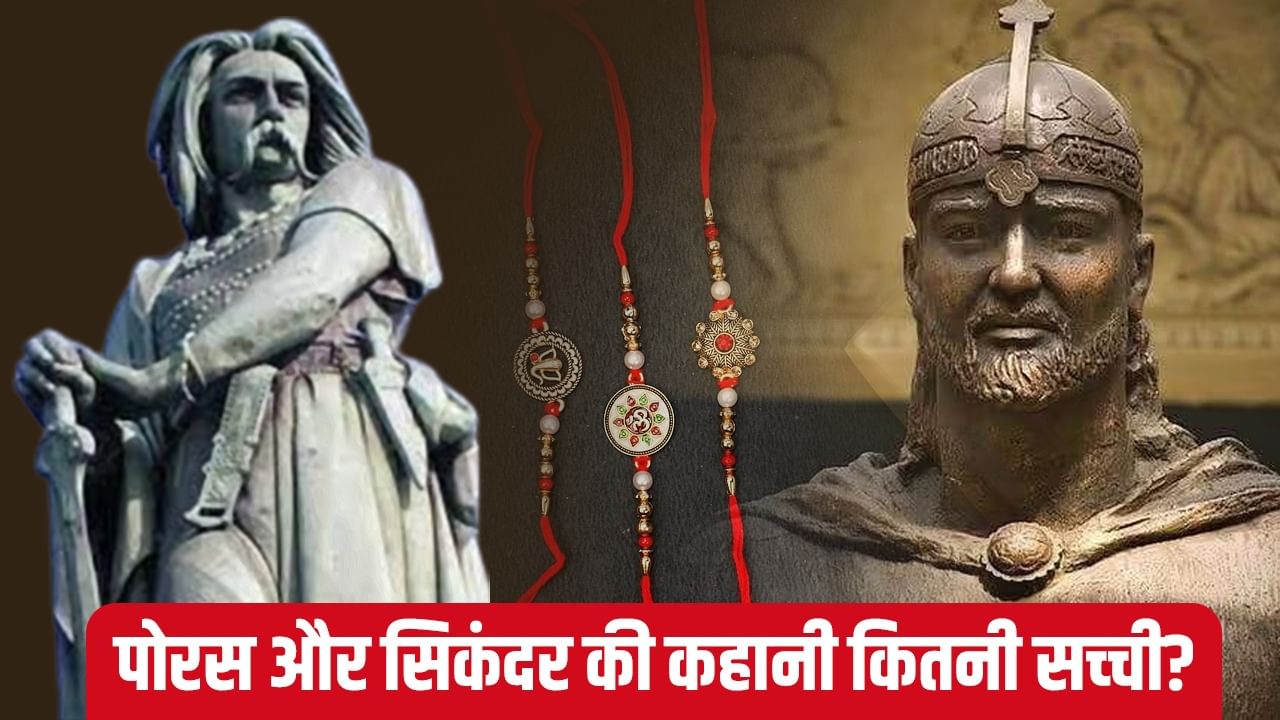King Porus and Alexander collided on the banks of the Jhelum River in Hindustan.
Raksha bandhan 2025: In the history of India, the war between Alexander The Great and Raja Purus (Porus) is recorded as an important event. There are many stories and legends related to this war, one of which is also that Alexander’s wife Roxana (Roxana) prayed to King Puru to protect her husband by tying a rakhi. This story is popular in Indian folk culture, people narrate this story in a very interesting way.
Listeners also listen with mind. But does it also have any historical basis? Let’s know, important facts and information related to it which are recorded in the pages of history.
Alexander, Roxana and Porus
Alexander Mahan (356–323 BC) was the king of Macedonia, who established a huge empire during his lifetime. He was known far and wide. Tales of his bravery were also heard and heard. With the intention of expanding his empire, 326 BC I came to India and clashed with King Porus on the banks of the Jhelum River.
There was a fierce battle between the two armies. Porus (Puru) was a powerful king of the Punjab region. Tales of his bravery were also famous. Alexander emerged victorious in this war, but impressed by the valor of Porus, he returned his kingdom again.
Raxana was the wife of Alexander, the princess of Bakhtria (modern Afghanistan) of Central Asia. Alexander had 327 BC from him. I got married, when he had conquered Bakhtria before coming to India.
Story of Rakhi and Raxana-Porus
The story of Raxana tying Rakhi to Porus is found in Indian folk tales and some modern articles, but there is no mention in ancient Greek, Roman or Indian historical texts. The opinion of major historical sources and historians is also the opposite. There is no concrete evidence of this effect, apart from stories and stories.
Greek historians have written a lot on the life, victory journeys and campaigns of Alexander the Great. Many have written all the texts. These prominent Greek historians include Ariane, Curtius Roofas, Deodorus and Plutarch etc. It is also important that all of them have described the battle of Alexander and Porus in detail, but no one mentions the story of Raksana to tie a rakhi or any kind of defense-sutra.
The Ariane’s book Anabasis of Alexander describes the war, the valor of Porus and the honor of Porus by Alexander, but there is no mention of Rakhi or Rocks. There is no mention of any such incident in Plutark’s Life of Alexander.
What is said in ancient Indian texts?
There is no detailed mention of the battle of Alexander and Porus in ancient Indian texts, nor does the story of Raxana or Rakhi. This story is also absent in Rajatarangini (Kalhan) or other medieval texts.
What is opinion on this issue of modern historians?
Famous historian Romila Thapar, R.C. Majumdar and V.A. Smith has also not mentioned this story in his books. Books like Ancient India (RC Majumdar), A History of India (Romila Thapar), and The Early History of India (VA Smith) describe only war, the valor of Porus and the strategy of Sikander, not Rakhi or Rocks. In such a situation, this question still remains historically, from where did the matter of protecting Rakhi and Alexander come from?
Historical development of the tradition of rakhi
The tradition of Rakhi or Raksha Bandhan is ancient in India, but the oldest mention of this is found in Mahabharata as Draupadi to tie rakhi to Krishna. By the time of Alexander, this tradition was not so broad or famous that the foreign queen (Rocks) adopted it.
Story emergence and popularity
The story of Raxana tying Rakhi to Porus was possibly in the modern period, especially in the British period, as a symbol of protecting Indian culture and brotherhood, it was coined in stories and gradually it came to the tongue of the people. At some places, it is also written that between 1910 and 1930, it was also published in a very interesting manner in the magazine Bal Bharti and Bal Sakha to be published for children.
Gradually, this story became popular to show the importance of Rakhi in Indian society and people accepted it as true. This story will be considered almost the same, just as grandmother and grandmother’s stories are not found in books but have been running orally generations. Some authors have called it “cultural imagination”, which can be said to be fabricated to highlight Indian values.
The study of all authentic historical sources and historians books make it clear that there is no historical evidence of the story of Raxana tying Rakhi to Porus. It is a folklore or cultural myth, which aims to highlight Indian tradition and brotherhood. Even this cannot happen because Alexander did not lose to Porus. Then there is no question of tying a rakhi to Porus to protect the husband’s life. Historically, Raxana had no role in the battle of Alexander and Porus, nor did any incidents come to light like tying a rakhi. Therefore, this story should be considered as the result of cultural imagination, not historical.
Also read: Loot of the British, Surrender of Mughals, how did Red Qila become part of freedom?
